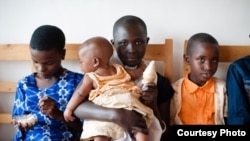The film, "Sweet Dreams," begins with a group of Rwandan women drumming, and in those rhythmic beats lies a story of unimaginable loss, but also of hope.
The women make up the first and only female drumming troupe in Rwanda. Most of them are still traumatized by the 1994 genocide, in which the majority Hutus slaughtered ethnic Tutsis, leaving almost one million people dead.
"Sweet Dreams" is a documentary which follows a group of these women as they try to rebuild their lives.
New era
Kiki Katese, a Rwandan theater director and drummer, founded the troupe in order to help women on both sides of the conflict recover.
“When you don’t yourself have hope, when you don’t have faith, when you don’t have joy, you can’t give anything you don’t have," Katese says. "In a country full of pain and grief, I chose to bring life, and I chose to bring joy.”
The name of the drumming troupe, Ingoma Nshya, means "new kingdom" or "new era." The drummers range in age from 16 to 60.
“We have widows, we have orphans," Katese says. "We have kids of perpetrators, we have wives of perpetrators.”
The troupe breaks barriers in more than one way. Drumming was practically taboo for women in Rwanda before Katese formed the group.
Sweet Dreams
Several years later, Katese met Jennie Dundas, the co-owner of an ice cream store, called Blue Marble, in New York City. Katese teamed up with Dundas and her business partner, Alexis Miesen, to open a similar shop in Rwanda.
Despite some initial setbacks, they opened the country's first ice cream store, named Inzozi Nziza, or sweet dreams, in the city of Butare. They hired and trained about 10 of the women drummers to work in the shop and each now has an equal share of the business.
Now, Hutu and Tutsi women are both drumming and working together, while becoming financially independent.
“I’m really happy that some of them were able to go back to school," Katese says. "Some of them are building houses, some of them are becoming autonomous and thinking about the future with hope.”
Transforming lives
"Sweet Dreams" recently premiered at the AFI-Silverdocs festival near Washington, D.C..
Filmmakers Lisa and Rob Fruchtman, a brother-sister team, say the film is more than just a feel-good story.
“What the story is more largely about, for us, is thinking outside the box when thinking about the possibility of social change and transformation in individuals’ lives," Lisa says, "how these small projects rather than large governmental projects for instance, can really transform lives."
Katese and her partners are planning more ice cream shops in Rwanda in the coming years.
Although opening an ice cream shop might seem like a simple thing, Rob Fruchtman believes it's actually an important development for the next generation of Rwandans.
"Children need to know that it’s O.K. to smile, that there’s a place for them to smile, that happiness is a part of their lives, not just survival," he says. "And I think that might be the larger message also of the film.”
The women make up the first and only female drumming troupe in Rwanda. Most of them are still traumatized by the 1994 genocide, in which the majority Hutus slaughtered ethnic Tutsis, leaving almost one million people dead.
"Sweet Dreams" is a documentary which follows a group of these women as they try to rebuild their lives.
New era
Kiki Katese, a Rwandan theater director and drummer, founded the troupe in order to help women on both sides of the conflict recover.
“When you don’t yourself have hope, when you don’t have faith, when you don’t have joy, you can’t give anything you don’t have," Katese says. "In a country full of pain and grief, I chose to bring life, and I chose to bring joy.”
The name of the drumming troupe, Ingoma Nshya, means "new kingdom" or "new era." The drummers range in age from 16 to 60.
“We have widows, we have orphans," Katese says. "We have kids of perpetrators, we have wives of perpetrators.”
The troupe breaks barriers in more than one way. Drumming was practically taboo for women in Rwanda before Katese formed the group.
Sweet Dreams
Several years later, Katese met Jennie Dundas, the co-owner of an ice cream store, called Blue Marble, in New York City. Katese teamed up with Dundas and her business partner, Alexis Miesen, to open a similar shop in Rwanda.
Despite some initial setbacks, they opened the country's first ice cream store, named Inzozi Nziza, or sweet dreams, in the city of Butare. They hired and trained about 10 of the women drummers to work in the shop and each now has an equal share of the business.
Now, Hutu and Tutsi women are both drumming and working together, while becoming financially independent.
“I’m really happy that some of them were able to go back to school," Katese says. "Some of them are building houses, some of them are becoming autonomous and thinking about the future with hope.”
Transforming lives
"Sweet Dreams" recently premiered at the AFI-Silverdocs festival near Washington, D.C..
Filmmakers Lisa and Rob Fruchtman, a brother-sister team, say the film is more than just a feel-good story.
“What the story is more largely about, for us, is thinking outside the box when thinking about the possibility of social change and transformation in individuals’ lives," Lisa says, "how these small projects rather than large governmental projects for instance, can really transform lives."
Katese and her partners are planning more ice cream shops in Rwanda in the coming years.
Although opening an ice cream shop might seem like a simple thing, Rob Fruchtman believes it's actually an important development for the next generation of Rwandans.
"Children need to know that it’s O.K. to smile, that there’s a place for them to smile, that happiness is a part of their lives, not just survival," he says. "And I think that might be the larger message also of the film.”





